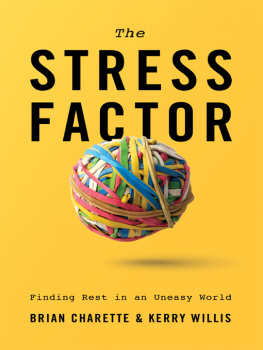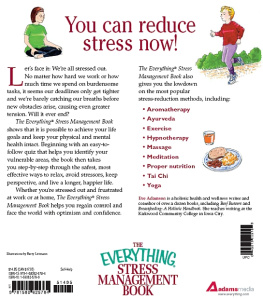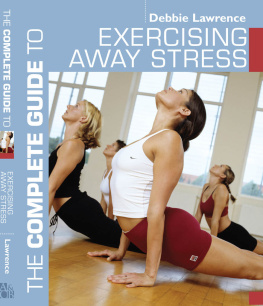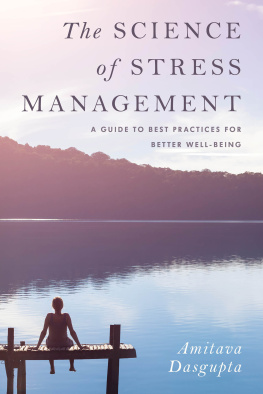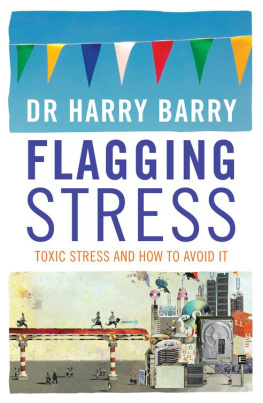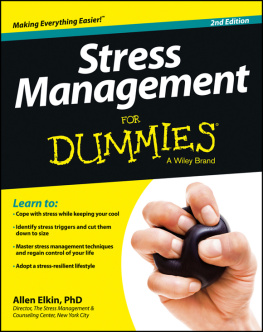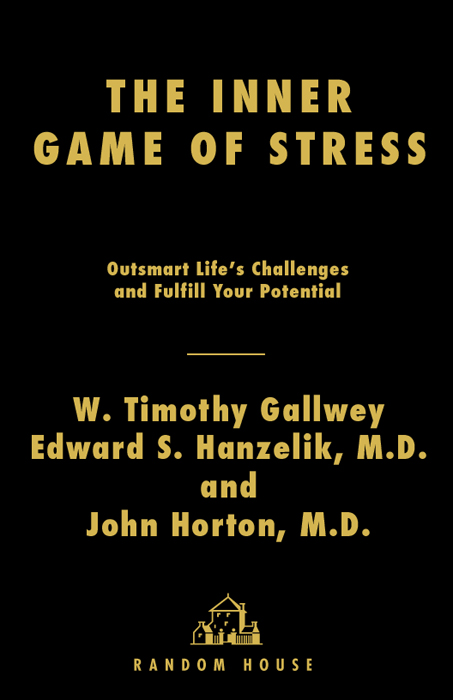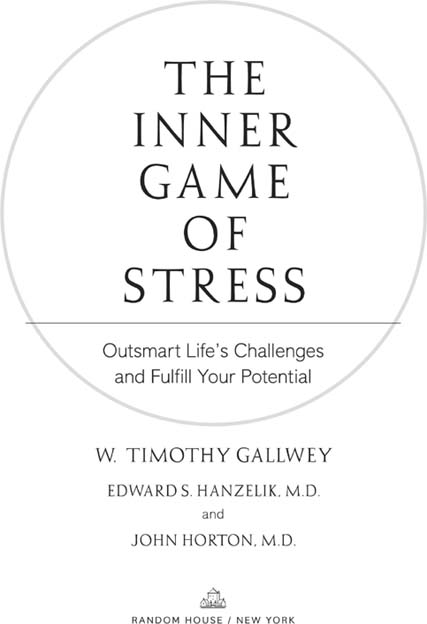A LSO BY W. T IMOTHY G ALLWEY
FOREWORD:
WHAT OUR PATIENTS TAUGHT US
By John Horton, M.D.,
and Edward Hanzelik, M.D.
A S DOCTORS, WE SEE THE MEDICAL EFFECTS OF STRESS EVERY DAY . T HE American Institute of Stress estimates that stress is a factor in between 75 and 90 percent of all visits to primary-care doctors. That figure does not surprise us. Although medical researchers find it difficult to measure the effects of stress, doctors know intuitively and experientially that chronic stress takes a toll mentally and physically. Even if they do not put a name on it, our patients generally know how bad stress feels, and most are aware of their own constellations of symptoms. For one, it might be headache and shoulder pain; for another, nausea, diarrhea, and abdominal distress; and for a third, heart palpitations, anxiety, and depression. For some, the effect is subtle. For others, stress is contributing to a life-threatening illness.
Most of our patients realize the stress in their lives has become a physical burden, but often they dont think they have a choice in the matter. They believe that external circumstances determine their levels of stress, and that its inevitable given their situations. They figure theyve just got to accept the stress and try to push through it. Or they feel stuck and dont see how they can change their current habits, circumstances, or emotional reactions.
When we began our medical practice, we saw how profoundly stress was affecting our patients, and we were inspired by them to find ways to have an impact on the core problemthe stress itself. We tried counseling, which began to have an effect, but we needed more than just words. Our patients expressed a need for practical tools. But what tools could we, as doctors, give them?
Usually, doctors look for medical solutions to the problems they seepills, surgery, or various therapies. But these strategies fall short in relieving stress because they do not address why the stress system gets activated in the first place. The stress system is designed as a life-saving biological response to danger, but for chronically stressed people, the system gets activated constantly, in response to everyday challenges. Mounting scientific evidence shows that constant stress is harmful to health. We wondered how we could help our patients go through the ordinary experiences of life without repeatedly activating their stress systems.
We had been friends with Tim Gallwey for a number of years, and we admired his approach to learning and his emphasis on the innate resources of individuals. In his Inner Game series of books, Tim demonstrates how people can maintain their equilibrium in the face of external stressors. We sought out Tim and discussed the possibilities of applying the insights of the Inner Game to the age-old issues of practicing medicine.
With Tims help we began to teach our patients the tools of the Inner Game, showing how they could be used to prevent chronic stress. The phenomenal results weve achieved over the last twelve years have moved us to write this book. In fact, after many of our stress seminars, people have looked at us with gratitude and said just that: You should write a book about this.
We have witnessed profound improvements in acute and chronic medical and psychological problems using the Inner Game. We have discovered that something as devastating and destructive as stress is actually within our patients control. We have seen that stress can be prevented by the artful mastery of the Inner Game.
When it comes to preventing illness and avoiding stress, our patients showed us they wanted to play a very active part. We learned that our role as doctors had to shift. We were no longer the experts with all the facts, jotting down our prescriptions, issuing orders, and demanding complete compliance. We had to become coaches, encouraging our patients to discover their own strengths and capabilities. Thats where Tims Inner Game strategies blended so well with medical practice. Even world-class athletes have coaches. Why? Because they know the coach can support them in their learning process, can help them see things they may overlook on their own, and can inspire them to greater achievement.
The role of doctor as coach is similarto help patients discover their own wealth of resources, to support their efforts to strengthen their health, and to inspire them to find ways to avoid the harmful effects of stress. Our patients showed us they could quickly learn to change the level of stress in their lives and improve their overall well-being. They showed us that coaching was often the most powerful help we could offer.
We realize it may seem inconceivable that people could avoid stress in the face of all of lifes challenges. Yet we continue to be amazed by the vast array of resources people have within themselves to live life in just this way.
We thank our patients for what they have taught us. They have opened a door for us to discover how to fully enjoy practicing medicine. In the pages of this book, you will find Inner Game strategies, grounded in current medical understanding and in the stories of our patients, which we hope will help you to reduce your experience of stress and to achieve top form in the game of your own life.
CONTENTS
PART ONE:
ONE
TWO
THREE
FOUR
FIVE
PART TWO:
SIX
SEVEN
EIGHT
NINE
PART THREE:
TEN
ELEVEN
TWELVE
THIRTEEN
FOURTEEN
FIFTEEN
SIXTEEN
SEVENTEEN
EIGHTEEN
NINETEEN
APPENDIX A:
APPENDIX B:
INTRODUCTION
THE INNER GAME AND STRESS
A WORLD-CLASS GOLFER ONCE CAME TO ME FOR COACHING . S HE TOLD me she needed help with the stress she felt when she was playing the last few holes of any competition in which she was in contention for the title. My hands begin shaking, and I lose touch with the feel of the club, she said. Her sense of pressure was heightened because if she could win just two more tournaments, she would be a candidate for inclusion in the Golf Hall of Fame.
Since it was impossible to simulate the circumstances of her stress, I asked the golfer two simple questions:
What is the goal of golf?
Why do you play?
Her initial answers were clear and simple. The goal of golf is to complete each round with as few strokes as possible. She continued, Why do I play? First, I love the environment, second, I love competition, and third, I love expressing my God-given talent.
I watched her closely as she responded. So far your hands arent shaking, I said. No foreseeable change would threaten her playing. Are there any other reasons you can think of for why youve dedicated yourself to the game of golf? I asked.
She reflected for a few moments, and then exclaimed, Yes, there are other reasons. First, I owe something to golf. Before golf I was a nobody. Golf has made me someone. And another thingI owe something to my loyal fans, who depend on me to be in contention in every tournament.



